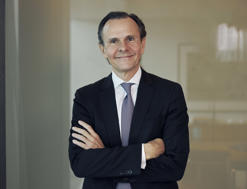- Home »
- Inform »
- Markets »
- Market outlook »
- More cautious for equities, opportunities with corporate bonds
to read
Stock markets have probably surprised most experts on the positive side during the first six months of 2023, with a majority presenting excellent half-year results. Driven by the euphoria around Artificial Intelligence (AI), the Nasdaq 100 has gained 38.75 %, the strongest increase in its 40-year history “I do not expect these positive market dynamics to continue in the second half of 2023,” Björn Jesch, Global CIO, says “Currently, valuations are very ambitious and should hardly be sustainable over a longer period.” Constructive on U.S. investment-grade corporate bonds, he has upgraded to “outperform”. “Expected total returns are attractive over a horizon of 12 months,” Jesch states. “Inflows are positive, and issuance activities are expected to slow down.” Jesch is somewhat more cautious with a view to emerging market stocks. “We have downgraded the rating to “neutral”, Jesch adds. The main reason is the slow recovery of the Chinese economy. Moreover, there have been more negative earnings revisions than in other regions.
Topics driving capital markets
Economy: United States surprising on the upside, China on the downside
- Strong consumer data, particularly in the services sector, have resulted in surprisingly robust growth for the U.S. economy of 2.2% in the first quarter of 2023. We nevertheless do expect a mild recession still in the course of this year.
- Dynamics of the Chinese economy have fallen behind expectations. In June, the Caixin purchasing manager index declined to 52.5 (May: 55.6), its lowest level in six months.
Inflation: rates still far too high
- Inflation rates are slightly falling in the United States but continue to stay on a high level. Primarily to blame are high inflation rates in the services sector. We forecast an inflation rate of 4.3% for 2023.
- In the Eurozone, inflation is still driven not only by the services sector but also by still strongly rising food prices. In 2023, inflation rates might be as high as 6.9%.
Interest rate policy: central banks are expected to continue hiking
- The Federal Reserve should stick to its restrictive monetary policy even if it has refrained from further hiking recently. We see rates between 5.25% and 5.5% before first cuts might occur in the second quarter of 2024.
- In the Eurozone, high core consumer-price inflation should prompt the European Central Bank (ECB) to raise interest rates further. Our forecast for key interest rates in the Eurozone by June 2024: 4.0 percent

Forecasts are based on assumptions, estimates, views and hypothetical models or analyses which may prove to be incorrect.
Source: DWS Investment GmbH, as of 10 July 2023

